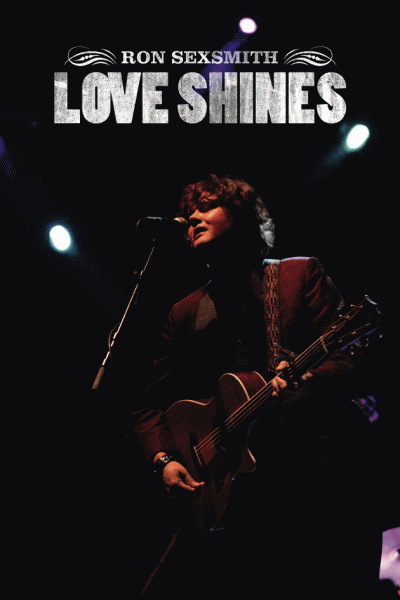Don’t worry. I know the real question is: “Where’ve I been?”
Sure, I’d heard of Ron Sexsmith. Well aware of his sterling reputation as a songwriter and interpreter of song. Good Lord, when Elvis Costello, himself, admits that Sexsmith helped him see “Everyday I write The Book” in a new light, you know there’s greatness afoot.
 For some reason, however, I’d just never been interested in delving into Sexsmith’s almost hysterically respected canon of work. Until now. Thank you, Hot Docs, for that. I, almost accidentally, got tickets to see the film “Ron Sexsmith: Love Shines,” on the final day of the Hot Docs Festival. I mistakenly thought that my wife would really like to see it and that I’d be able to get through it, because, a good documentary is never a waste of time. Turns out, my wife was merely somewhat interested in seeing the film. I’d already bought the tickets, so, away we went.
For some reason, however, I’d just never been interested in delving into Sexsmith’s almost hysterically respected canon of work. Until now. Thank you, Hot Docs, for that. I, almost accidentally, got tickets to see the film “Ron Sexsmith: Love Shines,” on the final day of the Hot Docs Festival. I mistakenly thought that my wife would really like to see it and that I’d be able to get through it, because, a good documentary is never a waste of time. Turns out, my wife was merely somewhat interested in seeing the film. I’d already bought the tickets, so, away we went.
Douglas Arrowsmith’s film about Sexsmith was originally meant to be capped by his subject’s triumphant appearance at Massey Hall (a lifelong dream of his) in 2006. Instead, it became a magnetic tale of a triumph of a different sort; a reclaiming of confidence.
Despite years of critical acclaim and fawning colleague reverence, Sexsmith had lost his mojo. Never able to break through to mainstream acceptance, it seems he came to doubt his ability to do so. He makes a conscious decision to change his approach, enlisting the services of super-producer, Bob Rock. The film chronicles Sexsmith’s struggle to craft something a little different (his latest album Long Player Late Bloomer), interceded with past performance clips, archival footage and biographical insight.
Not knowing much at all about Sexsmith, it’s hard for me to know if I saw the film with different eyes than longtime fans. Perhaps they knew and felt some things that were familiar, having followed Sexsmith from the outset. I can tell you that his polite, self-deprecating and stoically determined persona won me over almost immediately. Juxtapose that with soaring acclaim from luminaries like Costello, Steve Earle, Daniel Lanois and Lesley Feist and you quickly wonder: “Why isn’t this guy bigger?” I almost felt guilty that I hadn’t paid more attention in the past. What becomes so readily apparent about Sexsmith is that this is a man who can’t quite grasp, or fully take in the hullabaloo that others create over his artistry. In that sense, the film’s final scene is brilliant. We see Sexsmith walking along at the CNE midway, seemingly oblivious to the lights and fanfare all around him.
Sexsmith says he felt the film turned out a little more downbeat than he would have thought. Perhaps it was surprising to him, to see just how fragile his musical psyche had become. Or, maybe some of his confessions about the guilt he feels about the less than proud moments of his life are a little sobering to see, especially for one so seemingly prone to self-examination. However, those moments in the film were among the most sympathetic to me, for there is nothing more sympathetic than true remorse.
It struck me, about halfway through the movie, that I wanted to buy Sexsmith’s latest album. And not because the music overwhelmed me. I just liked him so damn much that I wanted to be part of his triumph. The triumph of reaching new ears. As I put the finishing touches on this column, I’m listening to “Long Player Late Bloomer” for the third straight time. Turns out I don’t just like him, I like his music a whole lot, too.
After the film had been screened, a question and answer forum was held with director Arrowsmith and Sexsmith, himself. A woman in the audience told Sexsmith that she’d heard a song of his on the radio sandwiched between songs by Paul McCartney and Bob Dylan. “What station was that?” Sexsmith asked. “Not sure,” was the reply. “Sounds like the station they play in Heaven,” Sexsmith cracked as he glanced up, sheepishly , from the stage.
Maybe he was being a little sarcastic, a little ironically self – deprecating. Or maybe, just maybe Ron Sexsmith was seeing himself through someone else’s eyes.